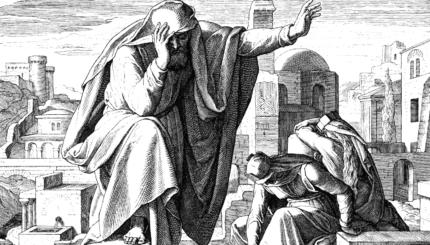When the seven days of end, the Bible decrees yet another holiday, the Eighth Day of Assembly. The Rabbis interpreted this as an encore. After the High Holy Days, after the intense seven days of Sukkot and pilgrimage, the Jewish people are about to leave, to scatter and return to their homes.
God grows nostalgic, as it were, and pensive. The people of Israel will not come together again in such numbers until Passover six months hence. God will soon miss the sounds of music and pleasure and the unity of the people. The decreed, therefore, an eighth day of assembly, a final feast/holy day. On this day Jews leave the sukkah to resume enjoying the comfort of solid, well built, well-insulated homes. The lulav and etrog are put aside; this day, Shemini Atzeret, is a reprise of the celebration of Sukkot but without any of the rituals. The message is that all the rituals and symbolic language are important but ultimately they remain just symbols.
Over the course of history this day has evolved into the day of the Rejoicing of the Torah (Simchat Torah). In Israel [and in many liberal congregations], Shemini Atzeret and Simchat Torah are celebrated together on one day. In the Diaspora where an extra holy day is added (making a ninth day), Shemini Atzeret is followed by Simchat Torah on the ninth day. The rejoicing makes a statement. Whatever the law denies to Jews, whatever suffering the people have undergone for upholding the covenant cannot obscure the basic truth: The Torah affirms and enriches life. At the end of this week of fulfillment, on this day of delight all the scrolls are taken out of the ark, and the Torah becomes the focus of rejoicing.
Reprinted with the author’s permission from The Jewish Way: Living the Holidays (Touchstone ).

Help us keep Jewish knowledge accessible to millions of people around the world.
Your donation to My Jewish Learning fuels endless journeys of Jewish discovery. With your help, My Jewish Learning can continue to provide nonstop opportunities for learning, connection and growth.


